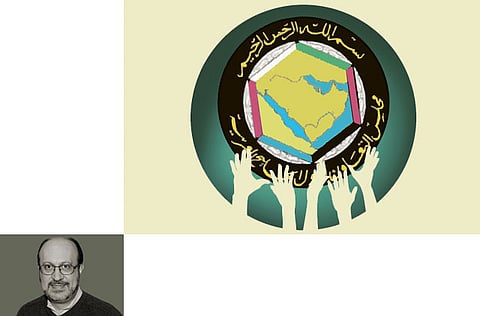Building a strong GCC union
Gulf leaders can catapult the alliance into a credible force by trusting in each other's intrinsic strengths

In an opinion piece published in Gulf News on February 20, Professor Abdullah Al Shayji, the erudite chairman of the political science department at Kuwait University, lamented Gulf Cooperation Council (GCC) states’ soft power approach and called on the alliance to adopt “more teeth and muscle”. As GCC officials consider Saudi King Abdullah Bin Abdul Aziz’s recommendation to embark on a union, was the three decades old experiment in cooperation ready to evolve? In the affirmative, could union be achieved, and under what conditions?
While GCC states were certainly conscious of their unique roles, dramatic changes were introduced starting in the post-9/11 era, when they reinforced existing partnerships with the US, Nato, the European Union and other regional security institutions, to promote stability not only in the Gulf, but in the greater Middle East as well. Importantly, and because of specific failures associated with preventive diplomacy throughout the 1980s and 1990s, the last decade witnessed the birth of a more robust, confident, and proactive GCC diplomacy.
Whereas the six Arab Gulf states consciously avoided emphasising the security aspect of their cooperation in 1981, events since then confirmed that this was no longer possible, which was the chief reason why King Abdullah urged the bloc to move from cooperation to full unity at the last GCC summit in December.
As he phrased it, the goal was to move “to a phase of union within a single entity,” which surprised the other rulers since each understood that Riyadh sought to exercise its “will to power”.
Indeed, the Saudi monarch wished to shape and lead Gulf security affairs more broadly, which included internal as well as regional security throughout the region and that required significantly beefed up political as well as military capabilities. Of course, what was unclear was whether the five smaller states were willing to acknowledge Riyadh’s asymmetric might.
Saudi role
This was the key pivot around which union turned. In other words, while the five smaller GCC member-states rejected the prevalence of Saudi Arabia within the organisation in the past, fear of the Saudi preponderance to impose security integration was no longer a viable option when concrete internal and regional threats loomed.
Still, acknowledging the kingdom’s military superiority was not akin to conceding on significant socio-economic gains that Abu Dhabi, Doha, Kuwait City, Manama and Muscat achieved over the past three decades. Consequently, the smaller GCC countries were in an excellent position to demand that Saudi firewalls against rapidly evolving social, religious, and even political norms, be relaxed. This meant that on democratisation, women’s emancipation, freedom of the press, religious tolerance, along with a series of other significant socio-economic developments, Riyadh was expected to acknowledge the many gains made over the years.
To be sure, although the GCC achieved a high degree of institutionalisation from the very beginning, especially when compared with the other significant intra-Arab grouping, the Arab League, this was the result of specific features applicable to the conservative states.
Naturally, the peculiar style of political interaction that prevailed on the Arabian peninsula — tribal societies that valued compromise and tolerance — distinguished the GCC from the league as the latter was dominated by unprecedented and somewhat passé revolutionary zeal. Gulf rulers retained ingrained flexibilities to achieve stated goals and seldom tied their hands when the greater good called for bold decisions.
Remarkably, GCC member-states committed themselves to view an attack on one member country as an attack on all since 1981, and in three known instances when such assaults occurred — Kuwait in 1990, Saudi Arabia after 2007, and Bahrain in 2011 — they acted in unison.
For now, it is clear that the GCC acted wisely in Bahrain and Oman, negotiated an agreement in Yemen, while individual member-states participated in on-going developments in Tunisia, Egypt, Libya, and Syria either directly or through the League.
If, as Al Shayji concluded, that GCC leaders were finally persuaded that soft power alone was no longer efficient and that the time was right to transform the cooperation council into “a bold confederacy” that could deal with political uncertainties, such a step necessitated the rulers’ to exercise their “will to power”.
Ironically, and while all GCC states were bound by their Charter to work towards the goal of further integration culminating eventually in the achievement of political unity, in recent years Kuwait, Qatar and the UAE opted to go their own separate ways.
Even Oman and Bahrain preferred to develop their distinct political institutions, and it remained to be determined what one would make of the Jordanian or Moroccan cases if the two monarchies eventually joined the GCC.
Therefore, the real challenge to ‘union’ today is whether GCC leaders can catapult the alliance into a credible force by resting on each other’s intrinsic strengths. Union will surely come to the GCC states when the distinct divisions — so aptly defined by the Economist in 1981 as the 5+1 organisation — were eliminated since union required trust among GCC leaders. For the smaller countries to trust Riyadh to provide for the Arabian peninsula’s security needs, and for Saudi Arabia to have faith in, and accept, fundamental social, economic, and political transformations that served the five rather well.
Dr Joseph A. Kechichian is a commentator and author of several books on Gulf affairs.


